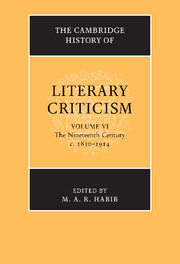
- Cited by 2
-
Cited byCrossref Citations
This Book has been cited by the following publications. This list is generated based on data provided by Crossref.
Latané, David E. 2014. A New Companion to Victorian Literature and Culture. p. 430.
Vdovin, Alexey 2024. The New Cambridge History of Russian Literature. p. 89.
- Publisher:
- Cambridge University Press
- Online publication date:
- February 2013
- Print publication year:
- 2013
- Online ISBN:
- 9781139018456
- Subjects:
- Literature, Literary Theory, English Literature 1830-1900
- Series:
- The Cambridge History of Literary Criticism (6)
- Collection:
- Cambridge Histories - Literature


